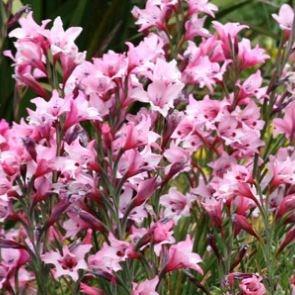
Gladiolus carneus
Gladioli (Species) Painted Lady Gladiolus
Winter Flowering gladiolus tend to be species Gladioli that originate from the winter rainfull areas of the Cape Province in South Africa. They follow the opposite growth pattern of Summer bedding gladioli, and they begin growth in late autumn as rainfall increases, continuing right through winter and then flower early spring. They are not generally winter hardy in cooler climates and require protection. Bulbs should be planted in autumn, and put under cover if living in an area that receives frosts or temperatures below 5 degrees centigrade. During the summer, they enter dormancy and should not be watered at all. Gladiolus carneus is a winter growing species. It grows up to 60cm in the right conditions, with blue-green strap like leaves. Arching flower stems emerge in early spring with 4-8 pink flowers, each with frilly edges and rich crimson throat markings.
Contributed by @richard.spicer.7906
-
Full sun to partial shade
-
Occasional watering
-
Not Frost hardy
-
Free draining and fertile
Common name
Gladioli (Species) Painted Lady Gladiolus
Latin name
Gladiolus carneus
type
Cormous perennial
family
Iridaceae
ph
5.5 - 8.0 Acid - Neutral
Plant & bloom calendar
-
Best time to plant
-
When the plant will bloom
full grown dimensions
 0.10 M
0.60 M
0.10 M
0.60 M
Gladiolus carneus
Winter Flowering gladiolus tend to be species Gladioli that originate from the winter rainfull areas of the Cape Province in South Africa. They follow the opposite growth pattern of Summer bedding gladioli, and they begin growth in late autumn as rainfall increases, continuing right through winter and then flower early spring. They are not generally winter hardy in cooler climates and require protection. Bulbs should be planted in autumn, and put under cover if living in an area that receives frosts or temperatures below 5 degrees centigrade. During the summer, they enter dormancy and should not be watered at all. Gladiolus carneus is a winter growing species. It grows up to 60cm in the right conditions, with blue-green strap like leaves. Arching flower stems emerge in early spring with 4-8 pink flowers, each with frilly edges and rich crimson throat markings.
Planting Season (Autumn)
From Mid Autumn TO Late Autumn
Winter growing Gladioli do best in well drained soil in a sunny position, and in a frost free environment. Plant the corms about 3-4 inches deep (depending on size, you want roughly 2-3 times the depth of the bulb) and with plenty of drainage. These gladioli species do not like heavy wet soils, but do require watering occasionally. Best is a mix of 50% john innes number 3 soli, mixed with 50% sand/grit in heavy soil. Slowly increase watering as bulbs start to form roots.
Flowering Season (Spring)
From Early Spring TO Late Spring
Winter growing Gladioli species will continue to grow during the winter months producing green sword like foliage, and then flower stems will appear from early spring depending on the species. Ensure the corms remain in a frost free environment while they flower.
Propagation from Cormlets (Spring)
From Late Spring TO Early Summer
As with other normal gladioli, winter growing species will start to form new cormlets around the base of the original corm shortly after flowering. These can be separated and potted on into individual pots in a good mix of a loamy based soil (such as John Innes no. 3) and 50% sand/grit to ensure good drainage. No watering should be done during summer when these gladiolus species are dormant, and watering should commence again in mid/late autumn like in its natural environment. Cormlets will normally take 3-4 years to reach flowering size.












